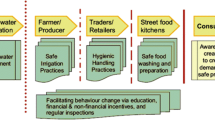Abstract
If Trinidad farmers are to meet consumers’ demands for safer food and also the requirements for export of produce then they must embrace Good Agricultural Practices (GAPs) on farms. This study assessed the extent of compliance with GAPs among smallholder vegetable farmers (n = 196) across Trinidad, West Indies. Farmers were randomly selected and surveyed using a structured interview schedule designed to capture personal, demographic and farm related data as well as the extent of compliance with GAPs from the recommended protocols governing production and post production practices. Data were analyzed using ANOVA and categorical regression. Overall, compliance was low among all farmers; farmers registered as exporters with the state owned national marketing company had lower compliance levels than those not registered; the level of compliance with GAPs was different based on gender, education, farming experience, number of extension visits received, size of farm, land tenure status and export status (all at p ≤ 0.05 of level of significance). Categorical regression results showed that the status of land tenure, number of extension visits received and the institution at which farmers were trained were the most important factors determining the extent of compliance with GAPs. Land tenure and number of extension visits were consistently the most important factors among the entire sample and subsamples (registered as exporters and non-registered with the state owned national marketing company). If Trinidad farmers are to produce vegetables of higher quality, which are safe to eat and meet all international safety protocols then urgent actions are needed i) to better educate the extension service in order to improve GAPs compliance and ii) for governmental intervention to improve farmers’ land tenancy arrangements.
Similar content being viewed by others
References
Badrie, N., DeLeon, S., Talukder, R. A. (2007). Food safety management systems: Initiatives of Trinidad and Tobago, West Indies, Philippines and Bangladesh. Proceedings of the 26th West Indies Agricultural Economics Conference, Puerto Rico, July, 2006: 84–93.
Drost, L., Long, G., Wilson, M., Miller, B., & Campbell, W. (1996). Barriers to adopting sustainable agricultural practices. Journal of Extension, 34, 6.
FAO. (2007). Safety and quality of fresh fruit and vegetables. A training manual for trainers. Food and Agricultural Organization of the United Nations. New York: FAO.
FAO. (2008). Good agricultural practices. Food and Agriculture Organization of the United Nations. New York: FAO.
FAO. (2010). In W. L. Mushobozi & P. Santacoloma (Eds.), Good Agricultural Practices (GAP) on horticultural production for extension staff in Tanzania training manual. FAO Gap working paper series 13. Food and Agriculture Organization of the United Nations. Rome: FAO.
Francis, D. E. (2009). The agriculture, food and health challenge; critical issues, perspectives and options. Morton Publishing Inter-American Institute for cooperation on Agriculture (IICA).
GlobalGAP (2009) GLOBALG.A.P: Annual report 2009. The global partnership for good agricultural practices. Issue: September 2009.
Jayaratne, K. S. U., Acker, D. G. (2003). Going forward in agricultural extension: Problems and alternatives in diffusing sustainable agricultural practices in Sri Lanka. AIAEE 2003 Proceedings of the 19th Annual Conference Raleigh, North Carolina, USA.
NAMDEVCO. (2011). Good agricultural practices starts with You. Trinidad: The National Agricultural Marketing and Development Corporation, Debe.
Rogers, E. (1985). Diffusion of innovation-innovation diffusion theory (3rd ed.). New York: Free Press.
Sadighi, H. (2002). Assessing farmers’ sustainable agricultural practice needs: Implication for a sustainable farming system. (AIAEE) Proceedings of the 18th Annual Conference Durban, South Africa.
Shaner, W. W., Philipp, P. F., & Schmehl, W. R. (1982). Farming systems research and development: Guidelines for developing countries. Westview: Boulder.
Simpson, L. (2003). Review of soil management and farming practices, including the use of Agro-Chemicals in the Caribbean, with particular reference to St Lucia and Jamaica. Caribbean Agriculture and Research Development Institute (CARDI) Project report No 2. Jamaica: CARDI.
Tilman, D., Cassman, K. G., Matson, P. A., Naylor, R., & Polasky, S. (2002). Agricultural sustainability and intensive production practices. Nature, 418, 671–677. doi:10.1038/nature01014.
Author information
Authors and Affiliations
Corresponding author
Rights and permissions
About this article
Cite this article
Ganpat, W., Badrie, N., Walter, S. et al. Compliance with Good Agricultural Practices (GAPs) by state-registered and non-registered vegetable farmers in Trinidad, West Indies. Food Sec. 6, 61–69 (2014). https://doi.org/10.1007/s12571-013-0322-4
Received:
Accepted:
Published:
Issue Date:
DOI: https://doi.org/10.1007/s12571-013-0322-4




